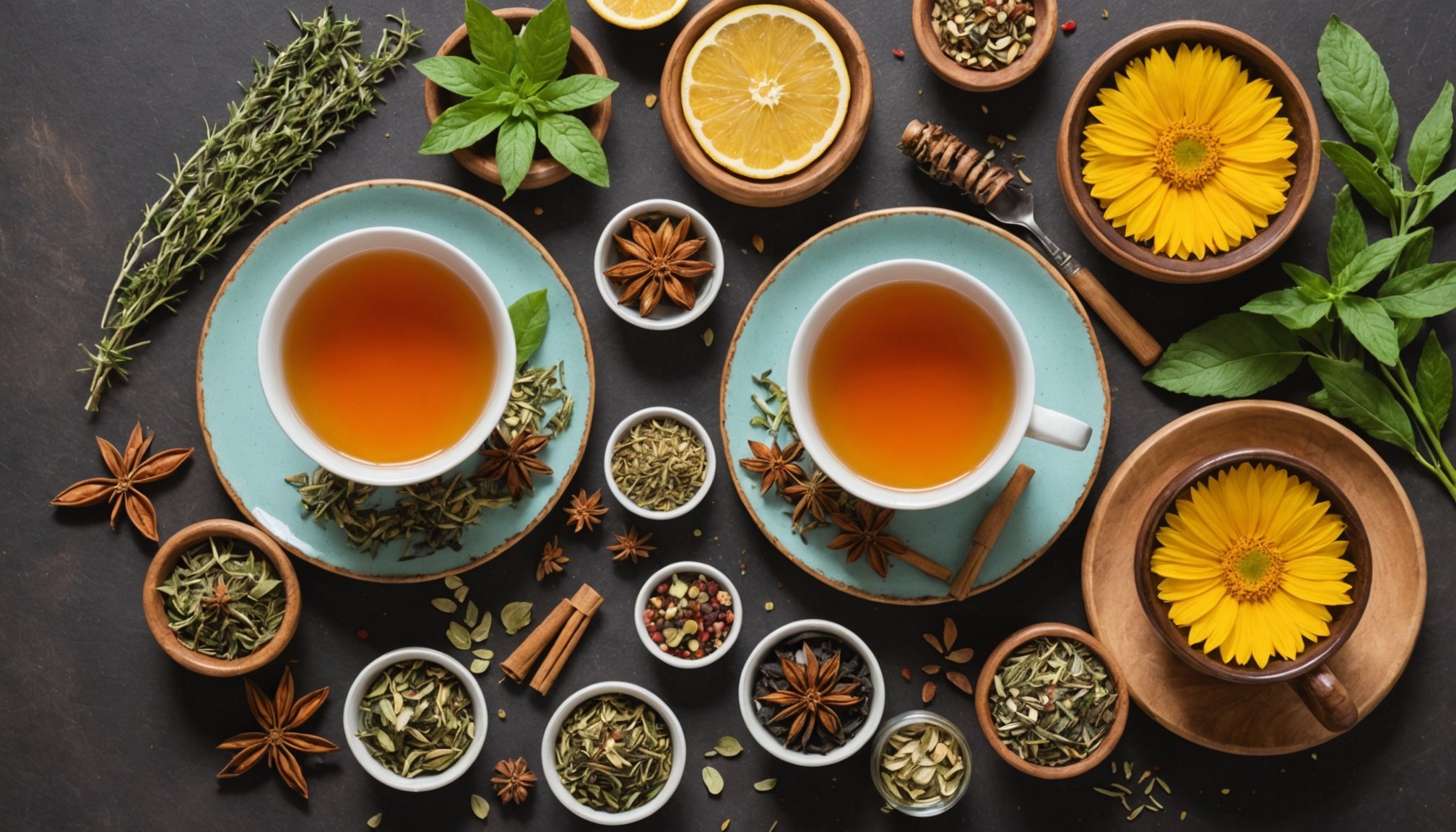Understanding Digestive Health
A healthy digestive system plays a crucial role in maintaining overall well-being by breaking down food, absorbing nutrients and eliminating waste efficiently. Proper digestion ensures that your body receives the essential nutrients it needs for energy, growth and cellular repair.
Common digestive issues, like bloating, constipation or acid reflux, can significantly impact one’s daily life, leading to discomfort and reduced productivity. These issues might arise from poor dietary habits, stress or underlying medical conditions.
Additional reading : Unlocking the benefits of gluten-free diets for individuals with non-celiac gluten sensitivity
Herbal remedies have long been used to support digestion and alleviate discomfort. They often contain compounds that act gently on the digestive tract, offering relief from symptoms. For example, peppermint tea, known for its soothing properties, can ease bloating and gas. Ginger tea, on the other hand, is famed for its anti-inflammatory properties and aids in calming the stomach, helping with nausea and indigestion.
Understanding the importance of digestion and the natural aids available can empower individuals to make informed decisions regarding their digestive health. As interest in natural remedies grows, the spotlight remains on the potential benefits of incorporating herbal teas as part of a balanced approach to maintaining digestive wellness.
Have you seen this : Revitalizing urban spaces: how community gardening enhances health and strengthens social connections
Types of Herbal Teas Beneficial for Digestion
Herbal teas offer a natural method to support digestive health, capitalising on their unique properties to alleviate discomfort. This section focuses on types of herbal teas that are particularly beneficial for digestion.
Peppermint Tea
Known for its ability to calm the stomach, peppermint tea is celebrated for easing symptoms such as bloating and gas. The key is its menthol content, which relaxes GI tract muscles, thus reducing spasms. For optimal results, brew peppermint tea by steeping fresh or dried peppermint leaves in hot water for about 5–10 minutes.
Ginger Tea
Ginger tea is famed for its anti-inflammatory effects, notably aiding digestion and easing nausea. This is largely due to gingerol compounds which stimulate digestion. To prepare, slice fresh ginger and boil it in water for around 10 minutes. Add lemon or honey for extra flavour and health benefits.
Chamomile Tea
For those seeking a soothing experience, chamomile tea offers calming effects alongside digestive benefits. Known to ease indigestion and reduce acid reflux, chamomile can be especially beneficial when consumed before bedtime. To enjoy its full potential, steep chamomile flowers in boiled water for 5 minutes and serve warm.
Therapeutic Properties of Herbal Teas
Herbal teas are celebrated for their therapeutic benefits, particularly regarding digestive health. Their secret lies in the bioactive compounds, which are naturally occurring chemicals offering health-enhancing properties. These compounds, like menthol in peppermint, gingerol in ginger, and bisabolol in chamomile, are known for their soothing and healing effects on the digestive system.
Scientific studies have highlighted how these herbal infusions help alleviate digestive discomfort. For instance, peppermint’s menthol acts as a muscle relaxant in the gastrointestinal tract, reducing spasms and discomfort. Ginger, lauded for its anti-inflammatory abilities, stimulates gastric motility, relieving nausea and enhancing digestion. Chamomile, on the other hand, is effective in lessening indigestion and acid reflux due to its calming effects.
Numerous studies back these health properties of herbal teas, illustrating their efficacy and potential advantages. Incorporating herbal blends into daily life could foster enhanced digestive function and provide a natural strategy to manage and prevent common digestive issues. As you explore these options, consider the array of flavours and functions each herbal tea brings to your digestive health regimen.
Brewing Methods for Herbal Teas
Brewing herbal tea isn’t just about combining water and leaves; it’s an art that enhances your experience. Understanding proper techniques ensures you get the most out of each cup.
General Techniques
Start by observing best practices for brewing herbal teas to preserve their flavour and health benefits. Use fresh, cold water and heat it to the recommended temperature. Herbal teas typically require boiling water, around 100°C, and should steep for 5 to 10 minutes. This allows the compounds to fully infuse.
Innovative Brewing Tools
Enhance your brewing with innovative tools that offer precision and convenience. Traditional methods like simple teapots are always effective. However, modern electric kettles with temperature controls or infusion pods can refine the process, saving both time and effort.
Tips for Making Great Tasting Herbal Tea
To elevate the taste, experiment with flavour combinations like blending chamomile with a hint of lemon. For sweetness and acidity, adjust ingredients based on personal preference. A touch of honey can balance bitterness, while a slice of citrus adds a refreshing zing. Enjoy discovering your perfect brew.
Potential Side Effects and Considerations
When incorporating herbal teas into your routine, it’s crucial to acknowledge potential side effects and precautions. While generally safe, some individuals may experience adverse reactions. For example, peppermint tea might cause heartburn or worsen gastroesophageal reflux disease in susceptible individuals. Ginger tea, though beneficial, can lead to stomach upset if consumed in large quantities.
It’s essential to consider existing health conditions before integrating herbal teas. Pregnant individuals, for instance, should be cautious with certain herbal infusions due to potential risks. Chamomile, known for its calming effects, may cause allergic reactions in those with sensitivities to plants in the daisy family. Individuals on medications should consult healthcare professionals to prevent interactions.
To minimize the risk, start with small amounts and monitor your body’s response. Consulting with a healthcare provider can offer personalised advice, ensuring herbal teas complement your health goals.
Being informed helps you enjoy the benefits of herbal remedies safely, supporting overall digestive health and well-being. Always prioritize safety and personal health needs when exploring natural solutions.
Incorporating Herbal Teas into Daily Routines
Daily herbal tea use offers a practical avenue to enhance well-being and support digestive health. There are several strategies for seamlessly integrating herbal teas into your lifestyle to maximise their benefits.
Best Times to Drink Herbal Teas
Finding the ideal moments for sipping on herbal teas can amplify their advantages for digestive health. For example, consuming ginger or peppermint tea after meals can aid digestion, while chamomile before bedtime promotes relaxation. Identifying the optimal time ensures that you receive the full benefits of these herbal infusions.
Creating a Herbal Tea Ritual
Transforming tea consumption into a mindful practice encourages consistent integration into your routine. Establishing a calming ritual by selecting your favourite herbal blend, brewing thoughtfully, and enjoying the aroma can create a serene experience. Such rituals foster consistency, ensuring that herbal teas become a beneficial and enjoyable part of daily life.
Combining Herbal Teas with Other Healthy Practices
Pairing herbal teas with a balanced diet and regular physical activity enhances digestive health. Herbal infusions can act synergistically with nutrients from a varied diet, while exercise stimulates digestive function. This holistic approach elevates the overall impact, creating a powerful regimen for improved well-being.
Understanding Digestive Health
Digestive health is paramount for maintaining overall well-being, enabling efficient breakdown of food, nutrient absorption, and waste elimination. An optimal digestive system supports daily energy, growth, and cellular repair. However, digestive issues like bloating, constipation or acid reflux can disrupt daily life, causing discomfort and lowered productivity. These may result from poor diet, stress, or underlying conditions.
Common digestive challenges highlight the importance of understanding how our body’s system functions. Identifying early signs of imbalance can empower individuals to act before problems worsen. Small lifestyle changes can make a big difference to your digestive well-being.
To mitigate these issues, incorporating herbal remedies can be beneficial. Herbal teas, such as peppermint, ginger, and chamomile, contain natural compounds that help ease digestive discomfort. These compounds act gently on the digestive tract, offering solutions without harsh side effects often associated with pharmaceutical options.
Recognising the significance of good digestive health, and understanding how certain herbal teas can assist, encourages informed lifestyle choices. Engaging with this natural approach supports a more balanced routine, contributing positively to one’s holistic health journey. Thus, the spotlight on digestion invites innovative and thoughtful participation in maintaining wellness.











